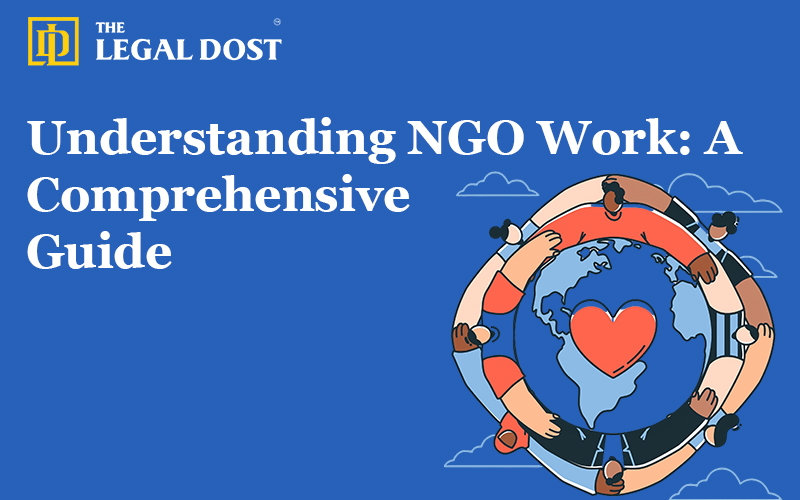Introduction of NGOs
NGOs, or non-governmental organizations, are important organizations in society that work to advance economic, social, cultural, and environmental development. The NGO full form denotes that they are a non-profit organization that functions without interference from the government. Yet what is an NGO? It is an organization that was founded by people or groups to solve different society issues without seeking financial gain.
What is NGO work?
NGO work refers to a wide range of initiatives meant to address pressing problems and enhance the quality of life in impoverished communities. These organizations are critical in filling the vacancies left by government departments. Knowing what is NGO work entails respecting their efforts in domains such as healthcare, education, poverty reduction, environmental protection, and so on.
How Does an NGO Work?
Understanding how does an NGO work necessitates familiarity with its operational framework. NGOs often begin by recognizing a problem, investigating its underlying causes, and organizing resources to address it. Donations, grants, or corporate social responsibility (CSR) efforts often provide their funding. NGOs also work with local communities, governments, and international organizations to optimize their influence.
Principles of transparency, accountability, and inclusivity guide the structure and activities of NGOs in India. This makes sure the efficient use of resources and the genuine empowerment of the target beneficiaries.
The Role of NGO in India
When it comes to solving societal issues, the role of NGOs in India is crucial. NGOs cover the gaps left by government programs or in situations that call for quick action. For example, NGOs often deliver emergency relief more quickly than government organizations throughout natural disasters.
Another important function of NGOs is advocacy. NGOs seek to affect public policy, raise the voices of the marginalized, and raise awareness of human rights, gender equality, and climate change. These initiatives guarantee long-lasting improvements and promote social justice.
NGO Work in India: Key Features and Activities
The volunteer-driven structure, mission-centric focus, and grassroots methodology are known as features of NGO activity in India. Because of these traits, NGOs are in a unique position to handle issues in both urban as well as rural areas. The following are some of the ways that the purpose of NGOs is carried out:
- Making people aware of problems in education, health, and the environment through campaigns.
- Giving women and young people practical training to help them get employment.
- Giving accident victims a place to stay and help with recovery.
- Doing research and advocating to try to change public policies.
- Working together with communities to run programs for sustainable growth.
These NGO activities show how flexible they are in how they solve problems in society.
What is the Role of NGO in Solving Social Issues?
NGOs work to make changes and find answers at the local level. They not only give people resources, but they also give them the tools they need to become self-sufficient. The aim of NGO work is to make society more transparent and welcoming so that everyone can meet their basic needs and have chances to grow.
NGOs also monitor governments and businesses, holding them accountable for their actions. This makes sure that growth in society is in line with moral and long-term values.
NGO Information: How They Operate
To better understand about NGO operations, consider how NGOs manage their resources and collaborate with stakeholders. An NGO’s success is dependent on its ability to form partnerships, secure funding, and maintain its reputation by being open about how it operates.
Often, understanding how NGOs work in India involves utilizing local networks, collaborating with volunteers, and devising innovative methods to reach individuals in remote areas, such as utilizing digital tools. For example, many Indian non-governmental organizations (NGOs) use mobile technology to offer health care in areas that don’t have enough of it.
What is an NGO in India, and why are they important?
It gives hope to millions of people and helps with problems like poverty and protecting the earth. Their value comes from their ability to run community-driven, targeted programs that get real results.
NGOs tirelessly strive for sustainable development, tackling everything from educating underprivileged children to preserving endangered ecosystems. The effect they had shown how powerful group effort and kindness can be.
Summary
NGOs are essential for making society fairer and more long-lasting. Independence, openness, and a focus on effect are some of the features of NGO work that make them stand out as important partners in national and global development. Knowing what NGOs are, what they do, and how they do it helps us understand their impact on Indian and global communities.
As change makers, non-governmental organizations (NGOs) continue to give people hope and move things ahead, demonstrating that everyone can make the world a better place through collaboration. Their work remains a crucial aspect of improving society and a force for good.
Understanding NGO Work: A Comprehensive Guide (FAQ’s)
An NGO is an organization that doesn’t work for the government and instead tries to improve society, the environment, or human rights.
NGOs find problems in society, get resources to fix them, and start projects to do so by working together and getting people in the community involved.
The main goals are to improve people’s lives and communities through social welfare, help, and lobbying for changes to the law.
Some of the things that are done are disaster relief, healthcare, education, protecting the environment, as well as fighting for human rights.
NGOs are essential for supporting long-term growth, filling in gaps in government services, and speaking up for those who are underprivileged.
Independence, transparency, a grassroots strategy, as well as a mission-driven emphasis are important features.
NGOs try to solve problems in both cities and rural areas by working together, raising funds, and doing volunteer work.
To start an NGO, you need to make sure it follows the law, decide what its purpose is, get resources together, and put together a team to carry out its programs.


